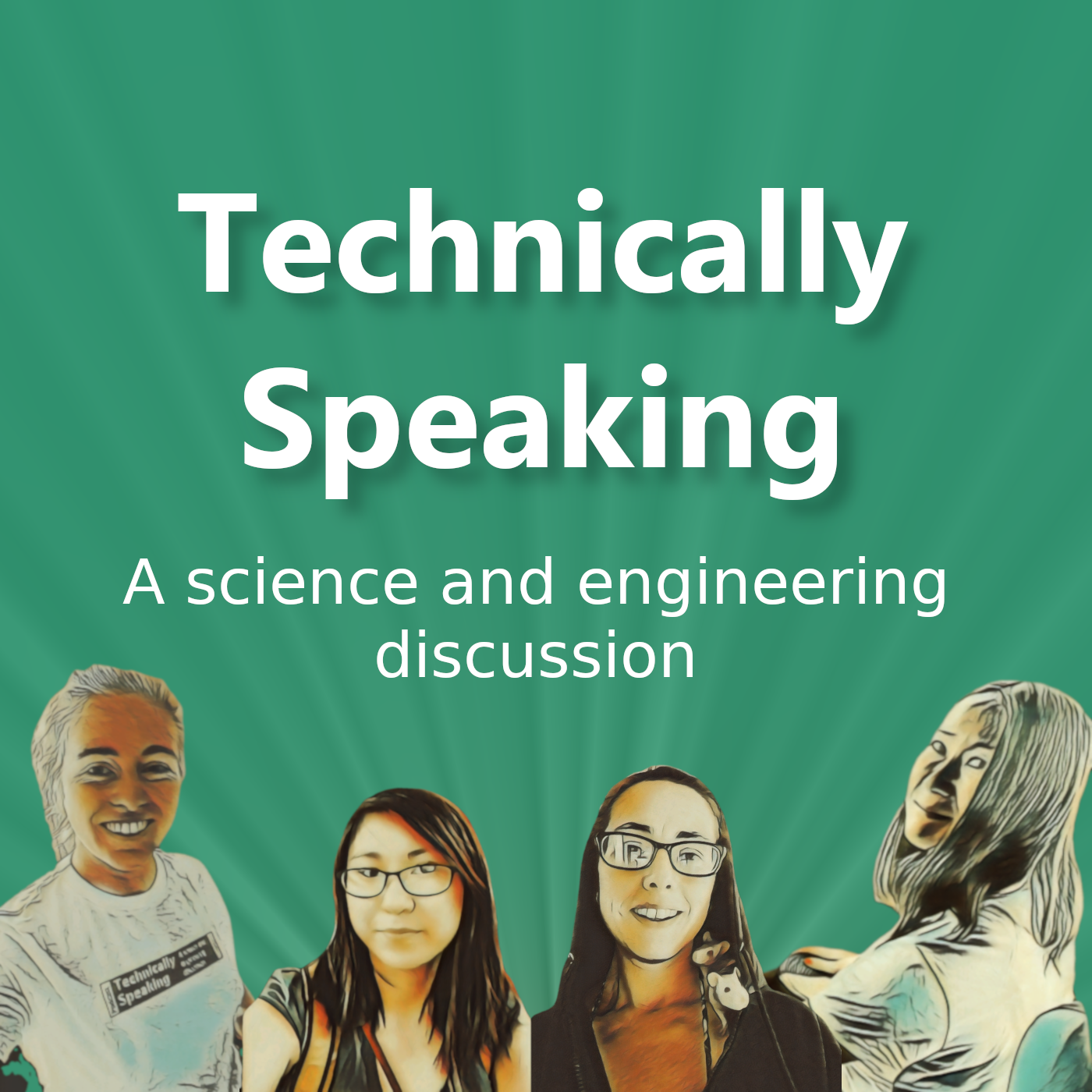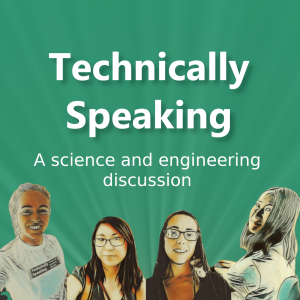

16.6K
Downloads
123
Episodes
Dive deep into the world of science and engineering with engaging discussions and thought provoking debates. The team share insights from careers in science and engineering, combining expert knowledge and scientific thinking with a touch of humour to make even the most complex topics accessible and entertaining for both enthusiasts and casual listeners. Sometimes we’re funny, often we’re opinionated, always we’re entertaining. Support us: https://ko-fi.com/techspeak_podcast X/Twitter: @TechnicallySp11 Instagram: technicallyspeaking.podcast Reddit: techspeak_podcast Email: techspeak.podcast@gmail.com
Episodes

Thursday Dec 04, 2025
Why have scientists sent moss into space?
Thursday Dec 04, 2025
Thursday Dec 04, 2025
Researchers were surprised to find that moss spores germinated after nine months hanging out on the outside of the International Space Station. Ellie and Laura dive into their research and go beyond it to look at why some things survive in space, the benefits of doing this sort of research and what it might mean for a more resilient ecosystem here on Earth.
Fact check:
- News about the space moss
- More news
- The original research article on the space moss
- The basics about radiation in space
- Tardigrades can survive some types of UV radiation
- How tardigrades have a genetic response to repair radiation damage
- The BBC Future article Laura mentions about various experiments on tardigrades

Thursday Nov 20, 2025
What if all chemicals had been tested for safety from the start?
Thursday Nov 20, 2025
Thursday Nov 20, 2025
Different nations have different approaches to testing and using chemicals to see how they can cause diseases. Antonia, Laura and Jasmin look at how chemicals are tested for toxicity, how harmful substances are controlled, and whether dose limits are important. They look at asbestos, radioactive substances, and more.
Fact check:
- Manufactured chemicals have led to an increase in childhood disease and shouldn’t automatically be presumed safe
- Safety data sheets for waterproofing spray and household bleach
- A history of bioaccumulation of mercury in fish
- News about banning and restricting sales of fish in some nations in relation to wastewater discharge from the Fukushima-Daichii site
- Statistics on global deaths per year due to asbestos exposure
- Statistics on deaths in the UK from asbestos exposure

Thursday Nov 06, 2025
What is agrovoltaics?
Thursday Nov 06, 2025
Thursday Nov 06, 2025
And is it a good idea? Laura, Jasmin and Antonia look at various scientific studies on growing crops and raising livestock in fields of solar panels to see what the effects are. They also look at some solar farms that are used in arid regions and the benefits they can have for crops and the environment.
Fact check:
- The random broccoli study
- A study of crop growing in arid regions
- One of the review articles/papers
- The other review article, this one on small ruminants
- The study that reported an improvement in the quality of sheep’s wool

Thursday Oct 23, 2025
What is aging?
Thursday Oct 23, 2025
Thursday Oct 23, 2025
And can we learn to live longer? Ellie, Jasmin and Emma discuss telomeres that form the ends of DNA strands, the long-lived members of the animal world, supplements and products to fight the signs of aging, and even the idea of living forever.

Thursday Oct 09, 2025
How is the safety of drugs determined?
Thursday Oct 09, 2025
Thursday Oct 09, 2025
It takes a long time for medicines to be developed. Looking at drugs used in women's health and more, Laura and Ellie look at what goes into their development, how the risks are weighed against the benefits, and how the known benefits of a drug can change as we learn more about them.
Fact check:
- A review of paracetamol/Tylenol development
- Statistics on drug development
- How much paracetamol is consumed in the UK in a year
- Thalidomide is still in use, but not for treating morning sickness
- Quinine for leg cramps should maybe be a last resort
- Statistics on use of the contraceptive pill
- Side effects of the contraceptive pill

Thursday Sep 25, 2025
How does cloning improve diversity?
Thursday Sep 25, 2025
Thursday Sep 25, 2025
Saving endangered species is vital for a healthy planet and cloning individual animals can help. Ellie and Laura look at the black-footed ferret, discuss some other endangered species that cloning is helping to save, and look at the history and challenges of cloning.
Fact check:

Thursday Sep 11, 2025
What would we do with infinite research funding?
Thursday Sep 11, 2025
Thursday Sep 11, 2025
When you care about sustainability, you can bet that becomes your focus. Laura and Antonia look at how to solve climate change through social engineering and behavioural science that involves brain chemistry as well as solving the problem of having finite resources that create inequality.
Fact check:

Thursday Aug 28, 2025
Can we get smarter when it comes to constructing buildings?
Thursday Aug 28, 2025
Thursday Aug 28, 2025
We’re using more energy and in the UK a lot of this goes into heating or cooling our homes but can we use natural processes to make this happen? Laura, Rwayda and Antonia discuss how using traditional clay in the Caribbean keeps houses cool while a smart architect in India has used fundamental physics to achieve the same feat. In the UK, passive houses with thick insulation are a thing but could we use these smart ideas to work with natural processes, rather than against them?
Fact check:

Thursday Aug 14, 2025
Are the seasons changing?
Thursday Aug 14, 2025
Thursday Aug 14, 2025
In the UK it feels like winters are getting warmer but the entire year is usually rainy. We remember things being a bit different when we were younger. Laura, Antonia and Ellie discuss evidence for changing of the seasons and look at the effect this has globally on extreme events such as wildfires, animal migration and plant growth. They also look at some research that identified new seasons and suggests humans should change their relationship with them.
Fact check:
- Seasons on a social level
- Summers getting hotter in the northern hemisphere
- Wildfire season in California is almost all year round
- New record high temperature in continental Europe
- There is less difference between UK summers and winters now compared to the 1700s
- Mouse-ear cress could be better adapted to warmer winters than we thought
- Some crops need a cold spell
- Some species of wales are altering their migration patterns
- Trees lose their leaves because falling temperatures halt chlorophyll production

Thursday Jul 31, 2025
Why is a novel type of fertility treatment in the news?
Thursday Jul 31, 2025
Thursday Jul 31, 2025
A special type of in-vitro fertilisation, that uses material from three people, has made some interesting headlines recently. Laura and Ellie discuss the technique and consider some of the major advancements that went into in-vitro fertilisation, also known as creating test-tube babies, and uncover some surprising facts. Did you know that research began in the 19th century?
Fact check:
- Recent news coverage with what we think is a sensible headline
- News on the first baby born using the three-parent technique
- What mitochondria do
- The role of mitochondria during fertilisation
- Some scientific background on eggs and the role of the cytoplasm
- More information on the cytoplasm
- The history of IVF
- A journal publication summarising some of the advancements in IVF
- Some more history of IVF
- A blog about safety and ethics
- Even more history of IVF
- News on the latest research using IVF to save an extinct species